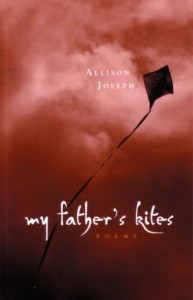
Published by Steel Toe Books, My Father’s Kites is Allison Joseph’s seventh collection. The title and haunting image on the cover telegraph the rite of passage (the death of a parent) that informs these poems, but readers will be surprised by the honest and complex portrait of a man now deceased that has inspired this book-length elegy: “If you could read these words, I’m sure you’d damn/ my college education, or the white man/ I never even told you that I wed./ I write about your life because I can.”
The emotional center of this book is the thirty-four sonnets in Part Two: “what the eye beholds.” Alternating between Elizabethan and Petrarchan sonnet rhyme schemes, the sequence follows the speaker’s stages of grief, from the hour she receives the devastating news (“I couldn’t push away what I’d just heard.”), to the moment of bittersweet acceptance: “My father isn’t coming up the stairs/ to yell my name or tease that I’m adored./ Some other man now wears the clothes he wore.”
But in the process of mourning/ healing comes the discovery of a complicated man’s humanity. This allows the speaker to shift away from the self, her sadness, regrets and rage, and to open up an avenue for her father to redeem himself as a man independent of his conflicted role as a father: “When friends would ask what does your father do?/ I’d hesitate, not sure what I could say./ Now that he’s gone, I find his resume--/ a typed-up list of all that he’d pursued,/ distinctive men he’d struggled to become.”
Touching and intensely personal, My Father’s Kites is a beautifully-rendered book of reconciliation with grief and loss. Though most of the poems are in fixed form (sonnet, villanelle, pantoum), I’m drawn to the following piece in free verse, in which the speaker turns to writing (not her own but that of her parents) as a way to understand the differences between the two parents, their deaths and the overwhelming sum of their absence:
Signatures
My mother’s handwriting was crabbed
and small, nothing like the elegant flourishes
my father used to sign his name,
his curlicues and fancy loops
far more feminine than Mother’s scrawl.
He called it chicken scratch, as if it were
some defect of character to have such
handwriting, he the moral superior
for having learned proper cursive.
He had the kind of signature
you’d expect to see on money,
power in decorous grasp.
My mother had a child’s writing,
letters collapsing in on themselves,
crawling off the page in scattered bits
of code. She wrote lefthanded,
penmanship made even more difficult
after she broke her writing arm
in a childhood fall from a tree.
Now all I do is write about them,
about losing them, no more notes
in either hand, no undisciplined script
from her, no haughty inscriptions
from him, no more evidence I came
from people who sometimes
wrote something down, words
that might be as simple
as a name, a number, a date of birth.
Rigoberto González was born in Bakersfield, California and raised in Michoacán, Mexico. He earned a ...
Read Full Biography

